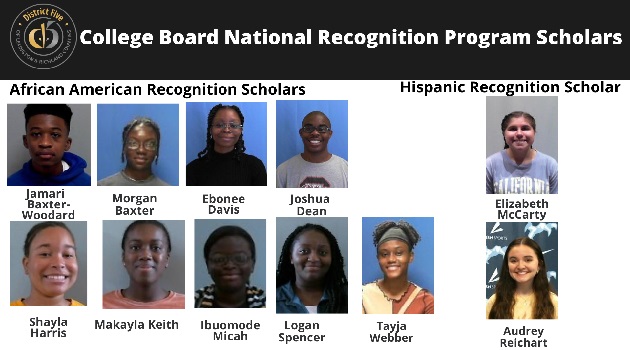A group of ten Lexington-Richland School District Five juniors and seniors have been named among this year’s National Recognition Program Scholars by the College Board. The group – which includes eight National African American Recognition Program Scholars and 1 National Hispanic Recognition Program Scholar – were eligible for the recognition based on their GPA and their high PSAT and AP Exam scores.
JaMari Baxter-Woodard (FIVE), Morgan Baxter (Dutch Fork High), Ebonee Davis (Dutch Fork High), Joshua Dean (Dutch Fork High), Shayla Harris (Irmo High), Makayla Keith (Irmo High), Ibuomode Micah (Irmo High), Logan Spencer (FIVE), and Tayja Webber (Dutch Fork High) were recognized as National African American Recognition Program Scholars. Elizabeth McCarty (Spring Hill High) and Audrey Reichart (Chapin High) were recognized for the National Hispanic Recognition Program.
“I’m excited about the number of students our district has recognized by the College Board National Recognition Programs,” said Anna Miller, School District Five Chief of Academics and Administration. “This recognition is a testament to our students’ hard work and to the commitment of our teachers to deliver high-quality education. Congratulations to each of these students and their families.”
According to materials from the College Board, to be eligible for the National Recognition Program, students must have a 3.5 GPA or higher and identify as African American or Black, Hispanic American or Latinx, Indigenous, or attend school in a rural area or small town. In addition, they must meet one of the following requirements: take the PSAT 10 in the spring of their sophomore year and score in the top 10% by state; take the PSAT/NMSQT in the fall of their junior year and score in the top 10% by state, or earn a score of 3 or higher on two or more AP exams by their junior year.
The program is designed to honor student accomplishments and to help create additional pathways to college for underrepresented students. Students can include academic honors on college and scholarship applications, and colleges around the country also use the list of honorees to identify high-potential students from underrepresented groups.



